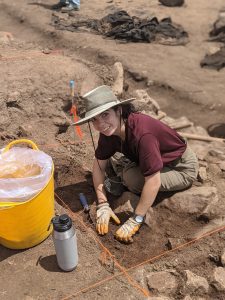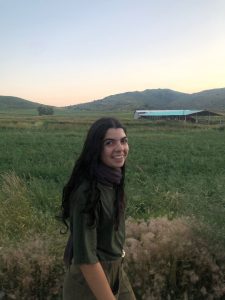Scholarship Opens Dream Opportunity for Young Archaeologist
Raynaliz Velazquez Feliciano graduated in Summer 2023 with a degree in Anthropology. Almost immediately she traveled to Turkey for a months-long excavation project. It was a dream come true for Feliciano, who arrived at UCF determined to practice archaeology abroad. In an interview with the College of Sciences, Feliciano shares how she achieved her goal and the lessons learned along the way.
Answers have been edited for length and clarity.
COS: Describe the scholarship you won.
Rayna: The Benjamin A. Gilman Scholarship provides students with limited financial means a chance to study or intern abroad. As results U.S students gain proficiency in various languages, understanding for different cultures and gain skills furthering their own professional experience. That in turn helps foster a relationship and mutual understanding between American students and other countries.

COS: Why did you apply for this scholarship?
Rayna: As an anthropology major studying archaeology, excavating abroad was something I was determined to do from the moment I arrived at UCF. But I had to figure out how I was going to financially pay for going abroad. That was going to be tough as a first-generation Puerto Rican college student who needed to work and pay for academic and personal expenses. The Benjamin A. Gilman Scholarship mission statement aligned with my experiences and offered the means reach my goal.
COS: What was the best part of your trip?
Rayna: The best part was talking to the locals and creating long-lasting friendships. I had put great effort to learn Turkish before traveling there. I wanted to come as a researcher and student in archaeology, but also experience and live in the same village because we would essentially be neighbors. Just as I’m happy to see non-Spanish speakers learn Spanish, I knew the sentiment from attempting the local language. The array of people, culture, and language you encounter in anthropology as you conduct research is why I chose this career path.

COS: How will you apply your research going forward?
Rayna: Now I can see the differences in how research is conducted locally versus abroad. The archaeological setting is unique in the sense that your colleagues live with you for weeks, if not months, in the host country. Not only did I learn a lot from hands-on experience excavating and geophysical survey, but also life experiences from other international students and older colleagues. I was put in situations I had never experienced before, which developed me as a person and researcher for the future.
COS: How does this experience carry forward to your master’s program?
Rayna: It’s most evident in how I now conduct research and manage time for personal and academic responsibilities. I had textbook knowledge as an undergraduate, but this allowed me to go outside my comfort zone and take initiative in unfamiliar areas.
COS: Is there any other information you would like us to include?
Rayna: Something that has helped me during my undergraduate years and now into my master’s is to maintain a good relationship with your advisors and professors. The Department of Anthropology is pretty small, so we all know each other. It almost gives me the atmosphere of an overly large family all seeking to understand humans in the past, present and future. I reached out to professors a lot, even to professors I never had class with, to introduce myself. I took a lot of first steps and initiative to know the department better and volunteer in areas of my research interest. The efforts I made opened opportunities for me to travel and further explore the field.
Who I was my first undergraduate year was very different than my last year. I was a passive student who did not like to speak up. I lived very far (and still do) from campus, so I had to commute every day for class or for non-class days to volunteer while working on weekends, making it hard to use all the resources from campus. Knowing I had restrictions, I planned the best I could to meet with professors, attend seminars, join zoom sessions, ask and ask, apply and apply. I knew that no one else was going to do this for me, so I became my greatest advocate.
COS: Why make the effort to pursue scholarships?
Rayna: I was so busy as an undergraduate, I saw applying for grants as a waste of time. I didn’t believe I would be awarded with money. But I think the determination and love for the career field made me go above and beyond to gain opportunities and experiences. I kept thinking to myself “what is the worst that could happen? They say no to scholarship? I think I’d rather hear it from them than from myself.” I learned to plan out my time accordingly for applying if I really wanted it, despite all the other responsibilities and factors to at least have attempted. And I did, and I got it.
